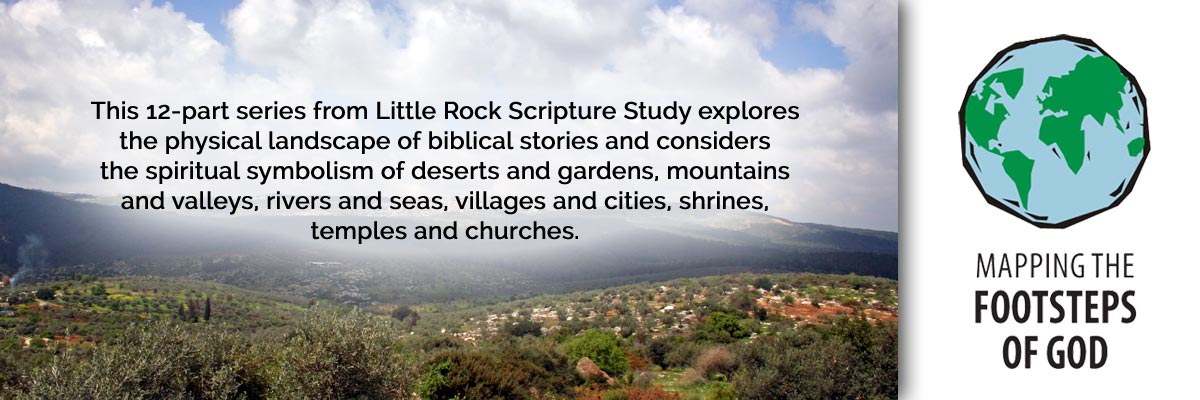Official Website of the
Catholic Diocese of Little Rock
God speaks to us on tops of mountains
Published: April 26, 2014
This is the fourth column in a 12-part series
By Clifford M. Yeary
Associate Director, Little Rock Scripture Study
I grew up in southeastern Idaho, within sight of the Grand Tetons of Wyoming. Their majesty can stir the soul of any one who beholds them. When religious experiences are called mountaintop experiences, it is no cliché. In the Bible, mountains are often the places where God encounters people, changes their lives and sends them back down to the world with a prophetic message.
 Noah's ark settled on a mountaintop when the floodwaters receded and after Noah offered God a sacrifice there, the Creator made a new covenant with creation, promising never to bring such destruction against the world again (Genesis 8:4, 20-22).
Noah's ark settled on a mountaintop when the floodwaters receded and after Noah offered God a sacrifice there, the Creator made a new covenant with creation, promising never to bring such destruction against the world again (Genesis 8:4, 20-22).
Generations later, it was on another mountain, Moriah, that Abraham willingly attempted, at God's command, the unthinkable sacrifice of his son Isaac, and it was there that God's angel stayed Abraham's hand and provided a ram for sacrifice instead (Genesis 22:1-14).
After murdering the Egyptian he found beating a Hebrew slave, Moses fled to Midian. While he was tending sheep for his father-in-law on Mount Horeb, God spoke to him from a burning bush, revealing the most sacred name of Israel's God.
It was there that Yahweh told Moses: "... the outcry of the Israelites has reached me, and I have seen how the Egyptians are oppressing them. Now, go! I am sending you to Pharaoh to bring my people, the Israelites, out of Egypt." When Moses balked, "God answered: 'I will be with you; and this will be your sign that I have sent you. When you have brought the people out of Egypt, you will serve God at this mountain'" (Exodus 3:9-10, 12).
As God delivered the Ten Commandments to Moses on Horeb (frequently referred to as Sinai as well), the mountain was shrouded in smoke, shook violently, and the people heard volleys of thunder (Exodus 19:18-20). Centuries later, when God spoke to the prophet Elijah on the same mountain, it was with "a light silent sound" (1 Kings 19:12).
When the Israelites crossed the Jordan into the promised land, they entered between two mountains. From Gerazim they received the blessing that would be theirs for serving God and from Ebal the curse that would come by rejecting God (Deuteronomy 11:29; Joshua 8:33-34).
Mountains were alluring to a wide variety of religious pilgrims, many of whom were not seeking the God of Israel. Whatever deities people worshiped, they would build altars to them in "high places," which could be any hilltop rising above the terrain. High places are mentioned negatively throughout the Pentateuch, the historical books and in many of the prophetic writings. Not a few of the altars on the high places, however, were dedicated to Yahweh.
Because a newly discovered scroll of the Law (probably Deuteronomy) forbade any sacrifices outside the Temple on Mount Zion, Josiah, king of Judah, destroyed the altars to Yahweh on the high places of Samaria and slaughtered the priests who sacrificed there (2 Kings 23:19-20).
The prophet Isaiah assured Israel that their holy Mount Zion would be the site of a feast unlike any in the history of the world: "On this mountain the Lord of hosts will provide for all peoples a feast of rich food and choice wines, juicy, rich food and pure, choice wines. On this mountain he will destroy the veil that veils all peoples, the web that is woven over all nations. He will destroy death forever" (Isaiah 25:6).
In Luke, Jesus teaches the beatitudes on a plain (6:17-23) , but in Matthew, we are given the beatitudes in the Sermon on the Mount, and the mountain setting is used by Matthew to help demonstrate that Jesus is a prophet and teacher greater than Moses (5:1-12).
Jesus' glory is revealed to Peter, James and John on "a high mountain" while Moses and Elijah confer with Jesus. The disciples want to build three booths in honor of Jesus, Moses and Elijah, but a heavenly voice proclaims that Jesus "is my beloved Son, with whom I am well pleased; listen to him" (Matthew 17:1-5).
While Mount Zion is mentioned more than any other mountain in Scripture, in the Gospels it is the Mount of Olives that is most associated with Jesus, especially in the final days before his crucifixion, when he would retire there after teaching in the Temple area (Luke 21:37). Most importantly, Jesus completed his ministry on a cross on a hill known both as Calvary and Golgotha (Mark 15:22-25).
Study Questions
- What mountains have special meaning to you? Why?
- God spoke to Elijah with "a light silent sound" (1 Kings 19:12). When might have God been subtly speaking to you?
- At Jesus' transfiguration (Matthew 17:1-5), what was the heavenly voice's message saying about their desire to build booths to Moses, Elijah and Jesus?
- Where in nature do you most keenly sense the presence of God?
This article was originally published in Arkansas Catholic April 26, 2014. Copyright Diocese of Little Rock. All rights reserved. This article may be copied or redistributed with acknowledgement and permission of the publisher.




